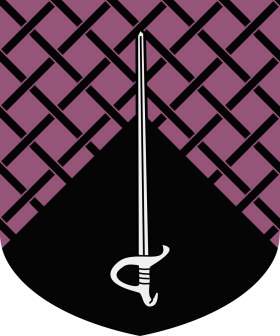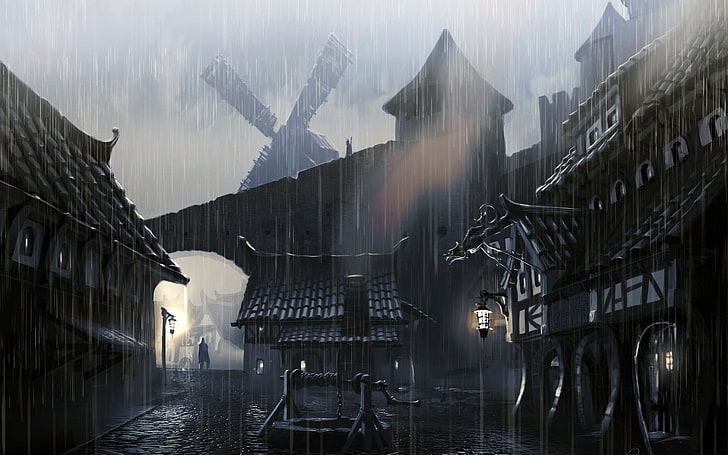Zethunir
Zethunir is the second most populous nation of the Sword Pact after Jullandy. Zethunir is a land of arts, passion, fiery tempers and frequent duels. Led by Virina Sufell, hailed as one of the finest duelists in Norvast, the Zethuniri have made war an integral part of their culture. A family's honour is made or lost by the martial prowess of its members, and dueling is at once a religious ritual, dispute mechanism, rite of passage, pastime, and many other things. The ruling Sufell family are also famous patrons of the arts. Upon their royal estate, a group of bards styling themselves the Consortium of Minstrels have been allowed to take over a great hall which is used for grand performances and the instruction of aspiring players.
Zethunir was recently involved in a small-scale conflict with neighbouring Jullandy, their bitter rival. Tensions remain extremely high, as Queen Sufell feels personally insulted by the Jullandian's disrespect for her authority and alleged attempts to agitate pro-democratic sentiment in her lands.
Structure
Zethunir is a kingdom in the traditional sense, having been ruled since its foundation by the Sufell family. The centralization of power has historically varied between monarchs, with the current Queen Sufell being very actively involved in the rule of her kingdom. The territory of Zethunir is divided into counties, each the domain of a noble family. The most powerful of these counties rival the Sufell family for influence, while the weakest own hardly more than a village. The Zethuniri army, when summoned, is generally made up of highly skilled swords-men and -women, but is made up primarily of county levies and is notoriously disorganized and unwieldly. Peasants who lack either the means or time to engage in dueling are excluded from most of Zethunir's society, and according to the Jullandians are extremely repressed.
Culture
Zethuniri culture is one of the most unique in the Sword Pact. The most notable feature of this culture is the tradition of the Sephaa. All Zethuniri who can afford it have five ceremonial coins sewn to their clothing, given to them upon reaching adulthood. Two are tied to the arms, one around the forehead, and two to the legs. A duel between two Zethuniri is ended when one of them cuts one of the other's coins off. If a Zethuniri loses five duels and thus all of their coins, they almost invariably commit suicide from the shame. The victor takes the coin they have won, and sends it back to the matriarch of their family. A very few Zethuniri seek to become Grave Dancers if someone in their family has lost all their Sephaa coins.
Besides the predominance of the Sephaa, Zethuniri culture is surprisingly friendly to outsiders. They often live in large homes with many family members and are proud to entertain guests, if only so the grandmother can show off the family's Sephaa coin collection on the mantle. Zethuniri cuisine is famous for being both delicious and extremely spicy. Musicians are valued in a paternalistic way, as the Zethuniri love music but believe musicians have neglected learning to fight and cannot defend themselves. Overall, a visitor to Zethunir is likely to find them to be loud but thoughtful, kind but quick to anger, and with the hilt of their rapier never far from their hand.
Public Agenda
It is well known in Norvast that Queen Sufell would like nothing better than to invade Jullandy and kill Lawspeaker Helene Morrow in single combat. The two nations are evenly enough matched that she has held back for the time being, but the situation remains volatile. In the meantime, the monarchy has invested in a comprehensive counter-espionage effort, an underground inquisition aimed at rooting out alleged Jullandian infiltrators. People arriving from the Jullandian border are sure to be heavily waylaid and questioned.
Assets
Zethunir has few natural resources of its own, and its economy is based upon secondary production of various goods. Skilled smiths, the Zethuniri import iron ore from Walston and create steel weapons and tools of high quality. They have a decent agricultural base, and import the remainder with great reluctance through third party trading with Jullandy. Zethuniri mercenary companies are prized in Norvast and are often hired by those with means for important tasks. The Queen requires a license for such mercenary companies to operate outside of Zethunir, and collects a tithe from their yearly earnings. Their more intangible assets include some of Tevastra's most famous musicians and artists, and a population with an average fighting skill far above most other nations'.
History
Zethunir used to be a province of the Empire of Avaros before its fall. During that time, Zethunir enjoyed prosperity thanks to its central location within the empire, although its swampy coast meant that Dyr Tolen remained the Empire's primary port. Even back then, the Zethuniri were known to be volatile and skilled fighters. Some theorize that this is due to the lack of hospitable land in Zethunir, with the forest in the north and the swamp in the south necessitating frequent fighting over a good place to live. In any event, the Empire's soldiers were trained in the provincial capital Selvara by demanding and knowledgeable instructors.
After the fall of Avaros, Zethunir became a violent and bloody land for almost two decades as the many noble families vied for dominance through a great number of single combats. When the dust settled the Sufell family, poor in gold but especially skilled with the blade, had carved their way to the top, and since then the descendants of Sufell have ruled as kings and queens.
Territories
Zethunir features the sprawling Gray Forest in the north, flat grasslands and farms in the area surrounding the capital of Selvara, and the Farswamp in the south. The Farswamp is the marshy lands formed as the Eastern Tear wends down from the Godsreach Mountains to the Dyronian Sea. The area is largely flooded and difficult to traverse except by small watercraft. Zethunir maintains a presence in the Farswamp with the settlement of Fencer's Crossing, a notoriously dangerous town even by Zethuniri standards.
The capital city of Selvara is austere and imposing, surrounded by a wall of dark grey stone quarried from nearby hills. Within these walls, Selvara varies between muddy slums filled with shoddy shacks, and finely cobbled streets featuring towering gothic manors. The perpetual rainfall of Zethunir has resulted in the erection of many canvas awnings covering busy streets and squares.
In the east, near the border with Dyr Tolen is the village of Pomero. Pomero is little more than a stop along the Imperial Carriageway and has a small population due to the lack of nearby fresh water. It features a single inn, the Courser's Mane, as well as a posting station where travelers can exchange their tired horses for fresh ones.
Nestled within the Gray Forest in the north is the town of Deiari. Thousands of years ago, Deiari was the home of a tribe called the Deiar who were later conquered and assimilated by the Zethuniri. To this day, the Deiar remain a distinctive people within Zethuniri although they are loyal to the throne. The Deiar people are masters of the axe, wielding it against trees and enemies alike. They are also renowned woodworkers, and on the approach to Deiari, travelers will begin to see many trees carved with intricately detailed artistic impressions.
South of Selvara, on the banks of the Eastern Tear is the town of Castuan. Castuan serves as a launching port for river boats venturing down into the Farswamp. It also has two large water mills which utilize the river's strong current to grind wheat from nearby farms into flour. Castuan therefore accounts for a large proportion of Zethunir's agricultural production. Many people in Castuan live in floating houses constructed within repurposed river boats, while the buildings on shore are mostly barns, warehouses and shops.
Deep within the Farswamp, accessed only via river boat is the large settlement of Fencer's Crossing. The town exists far from the queen's rule in the capital, and its natural remoteness has made it a natural haven for thieves, smugglers and worse criminals. The town is built upon several small islands, and because the water level in the swampy lowlands varies from day to night, most homes and other important buildings are built several feet above ground on stilts. However, those without a home to sleep in and other unfortunates are forced to live in the Waterlogs, the district of Fencer's Crossing which is flooded by night. During the day, the denizens of the Waterlogs can return to the soaked homes to eat and sleep, but by night, as the water level quickly rises they are forced to come to the higher and more affluent parts of Fencer's Crossing. This causes a lot of conflict between the two areas and means that Fencer's Crossing is especially dangerous at night.
West of the Farswamp is the collection of villages known as Madar Ambria, which is a Zethi phrase meaning "the Mother's Children". Upon Zethunir's independence, many powerful families fought to seize leadership of the new kingdom. While the Sufell family was ultimately successful, the Caspi family had been the favourite. Recognizing the Caspis as a strong potential rival, the first Sufell queen banished them to the Farswamp. Not wanting to try their luck in Fencer's Crossing, the Caspis fled to a region at the edge of the swamp featuring several small lakes. The first tiny village they built with great difficulty was called Madar, the Mother. The Caspis had brought their many attendants and courtiers with them into exile, and these people soon grew tired of service and wanted to venture out on their own. The Caspis had little choice but to accept this demand. The settlement founded by these servants became the first of the Ambria, the Children. In the time since, the Caspis and their former servants have become more closely integrated, as the usual social barriers broke down in times of hardship, and some marriages between the two groups took place. Several other Ambria have been founded at other nearby lakes, and each looks to Madar for leadership. The Matriarch of the Caspi family rules from there, ensuring cooperation between the Ambria and as much prosperity as can be found so far from civilization.

If you dance with death, be sure to lead.
Founding Date
344 AE
Type
Geopolitical, Kingdom
Alternative Names
The Coinshirts; the Grave Dancers
Predecessor Organization
Demonym
Zethuniri
Leader
Government System
Monarchy, Absolute
Location
Related Species
Remove these ads. Join the Worldbuilders Guild









Comments